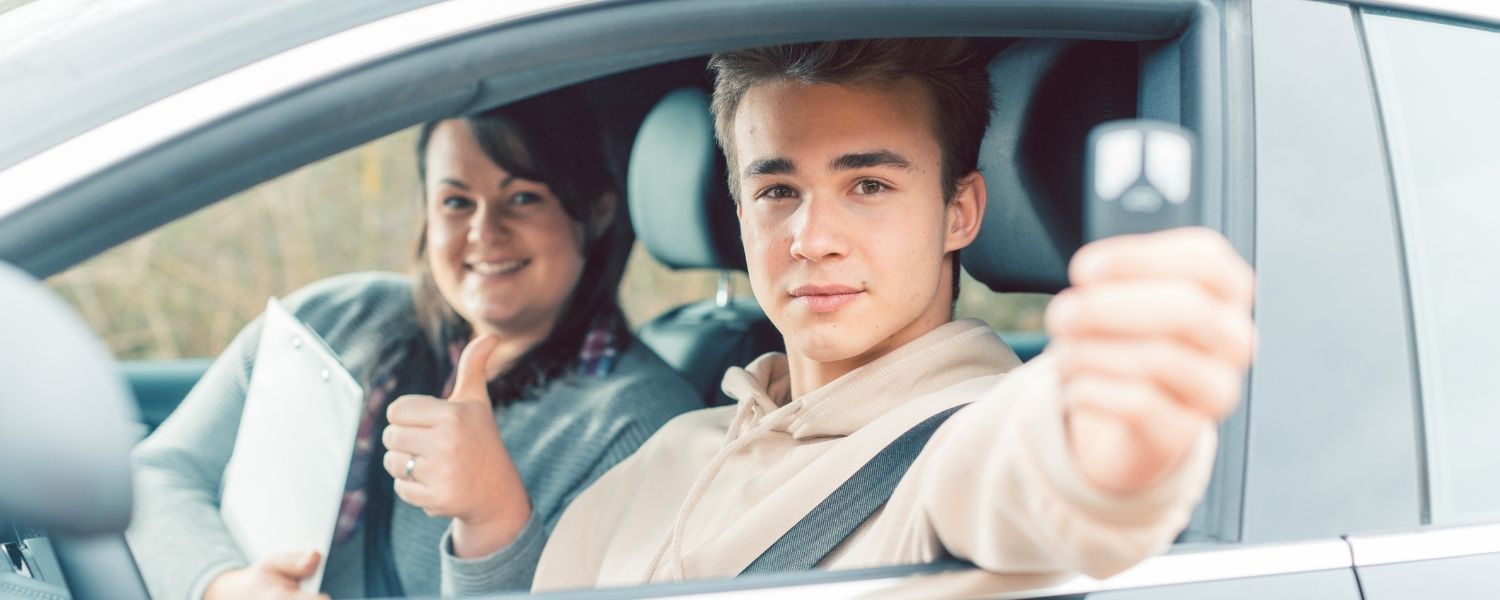Getting a driving license in Germany is a thorough process that involves preparing a variety of application documents and meeting specific requirements. It’s essential to prepare well, especially for the theory test, as 39% of new drivers fail on their first attempt, according to TÜV.
Please note that if you already have a driving license from your home country, you may be eligible to exchange it for a German driving license by following a similar process to the one outlined in this article. A driving school in Germany will guide you through the necessary steps.
In this article, we will cover the following topics about driving license in Germany:
- Steps to get a driver’s license in Germany
- Documents required to get a driver’s license from scratch
- Driving license age requirements in Germany
- Costs of getting a driving license in Germany
How to get a driving license in Germany?
To get a driving license in Germany from scratch, you must follow certain steps. Now, let’s have a look at those steps to get a German driving license.
Enroll in a driving school
In Germany, the theoretical and practical driving tests are conducted through driving schools (Fahrschulen). Therefore, you must be enrolled in a driving school in order to take these tests. Usually, you will also be asked to prove that you are enrolled in a driving school in order to obtain a driving license from the authorities authorized to issue driving licenses.
If you are learning to drive for the first time, you must attend a driving school; independent teaching is illegal (i.e. a friend or family member cannot teach you).
Based on the German law
- at least 14 courses of theoretical training
- 12 lessons of practical “special training driving” (Sonderfahrten)
are needed prior to getting a license.
Get an eye examination in Germany
Before applying for almost all categories of driving license, you will need to pass an eye test at an optician or eye specialist. Remember, the cost of this test is usually covered by health insurance. In Germany, you can also get your eyes tested free of charge at opticians such as Fielmann.
If there are any irregularities in your health or if you are applying for a category C or D driving license, you will also need to undergo a medical examination. Everyone over 50 years of age must repeat these tests every five years.
Take first aid course for driving license in Germany
People who want to get a driving license in Germany must also take a “first aid course” (Erste Hilfe Kurs). This course is usually offered by charitable organizations such as the German Red Cross (Deutsches Rotes Kreuz) or Malteser, costs around 40 euros and lasts around eight hours. Just search for Erste Hilfe Kurs on Google Maps.
The training is in German, but no one will question your knowledge of German – strange, right?
Pass the theory exam
According to TÜV, which administers the theory test, 39 percent of novice drivers failed their theory test in 2022 .The theory test is not easy at all and you have to study hard. When you are ready for the theory test, your driving school will arrange this test (Theorieprüfung) for you.
Prior to taking the theory exam, please ensure that you study the traffic signs in Germany with our guide.
In Germany, you can take the theory exam in many languages, including Spanish, Turkish, English and Arabic. The test consists of 30 multiple-choice questions worth a total of 110 points. You are only allowed to make a mistake worth 10 points.
Tip: If you fail the exam, you may be entitled to retake it for a fee.
Pass the practical exam
Your practical driving test (praktische Prüfung), which is required to obtain a driving license in Germany, will be organized by your driving school. After passing the theoretical test, you must take the practical test within 12 months. The practical test (Praktische Fahrprüfung) takes 30 to 45 minutes and requires 12 hours of driving training. At this point, it is imperative that you receive your training from professionals and not from relatives.
During the test you will be accompanied by an examiner and your instructor, who will usually sit in the back seat and assess your driving skills. The test is usually conducted in German, so it may be useful to take a German lesson to learn basic driving terms.
Remember to bring your passport or ID card with you on the day of the test, and your glasses if you wear them.
Get your driving license
If you pass the practical exam, you will be issued a provisional driving license (Vorläufiger Führerschein). You must collect your permanent driving license from the driving license office within four weeks.
If you are getting your driving license from scratch, you will be on probation for the first two years after you get your driving license in Germany. If you break any rules during this period, you risk losing your license. It is also completely forbidden to drink alcohol before driving during this period.
Documents required to obtain a driving license in Germany
So which documents are required to get a driver’s license? Let’s share the answer with you as a list:
- Driving school registration
- Exam application fee
- International passport
- Eye examination report
- First aid course certificate
- 1 biometric photograph
Driving license age requirement in Germany
In Germany, you need to be 18 years old to get a type B driver’s license. In some states in Germany, if you are already 17 years old, you can get a driver’s license through the accompanied driving program (Begleitetes Fahren). From the age of 16 you can start the process by enrolling in driving lessons.
Driving a manual transmission car in Germany with an automatic transmission license
In Germany, from April 2021, learner drivers who pass their practical test in an automatic transmission vehicle can now also drive manual transmission vehicles. This new regulation was introduced by regulation B197. However, in order to be able to drive a manual transmission vehicle, the learner driver must have taken at least 10 hours (45 minutes each) of lessons on driving a manual transmission vehicle during training.
Cost of obtaining a driver’s license
In a country like Germany, where there are many economic and social differences between cities, of course, we cannot say that there is a clear and generalized cost of getting a driver’s license. However, if we make a generalization, it may be wrong to draw a complete financial picture in a country where it is quite large.
If you start the process from scratch to get a driver’s license in Germany, you may have to sacrifice an average of 1500 – 2000 Euros. Of course, this amount may vary depending on the city you live in, the driving school you choose, the hours of driving lessons you take and the fees you pay for your exam repetitions.
Here’s a look at the estimated fees:
- Driving school registration fee: 900 Euros (can be up to 2000 Euros)
- Theoretical exam registration fee: 80 Euro
- Theoretical exam paper fee: 25 Euro
- Practical exam appointment: 180 Euro
- Practical exam entrance fee: 130 Euro
- 90 minutes practical lesson: 120 Euro
- First aid course training: 40 Euro
- Eye examination report: 10 Euro
- Driving license application fee: 43 euros
- Theoretical exam material: 25 Euro
Driving license revocation in Germany
You have your driver’s license and you are dreaming of taking your car on the road. At this point, of course, do not skip the issue of traffic insurance. You can read our article for detailed information.
After you get your driver’s license, you may face the danger of losing your license unless you pay attention to the rules. If you get a driving ban, your license will be withheld by the authorities for a few months. If it is revoked, you will lose your driving license.
Your driver’s license will be confiscated, for example for endangering human life, driving under the influence of alcohol or drugs, or if you receive a total of 8 penalty points. After you get your driver’s license, you will be on probation for 2 years. During this period, you should take care not to violate any traffic rules.
Frequently asked questions about getting a driving license in Germany
In this section, we will answer frequently asked questions about getting a driver’s license in Germany.
Is my foreign driving license valid in Germany?
When you come to Germany as a tourist, most foreign driving licenses will be accepted.
If you hold a driving licence from a non-EU or non-EEA country, it will be valid for six months after you establish your permanent residence in Germany. Beyond this period, your licence will no longer be recognized. For example, if you take up residence in Germany, your UK driving licence must be converted into an EU/EEA driving licence within six months.
However, In exceptional circumstances, the driver licensing authority may, upon request, grant an extension of up to six months (so one year in total) if you can provide sufficient proof that your stay in Germany will not exceed 12 months.
You can read the rules of your country in the official statement.
Can I drive a manual car with an automatic transmission license in Germany?
Yes, with the latest law in Germany, a person who passes the automatic transmission practice test is allowed to drive a manual vehicle. However, you need to take at least 10 hours of lessons for this.
In which languages can I take the theory test in Germany?
You can take the theory driving test for a German driving license in various languages. The test is usually offered in the following languages:
- German
- English
- French
- Spanish
- Greek
- Italian
- Portuguese
- Polish
- Romanian
- Russian
- Turkish
- Croatian
- Arabic
However, taking the test in English or other foreign languages may incur an additional fee. You can clarify which languages you can take the test in in consultation with the driving school or test center you are applying to.
Is the driving license confiscated during a driving ban?
Yes, it can be confiscated. However, this usually lasts for several months.
In which cases will my driving license be revoked?
In Germany, your driving license will be revoked if you drive in a way that endangers traffic or if you drive under the influence of alcohol or drugs.




